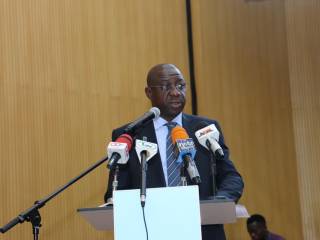- Penalties stipulated for default and consumer compensation.
The Nigerian Communication Commission (NCC) and service providers in the telecom industry, yesterday (7/11/2019) resolved and presented a new guideline to ensure a more effective approach to resolving telecoms services-related consumer complaints in Nigeria.
The document, 'NCC Revised Complaints Categories and Service Level Agreements (CC/SLAs)' is binding on all licensees of telecoms services, and it is designed to strengthen regulatory protection for the over 179 million telecom subscribers in the country through quicker resolution of complaints.
The new document identifies 18 complaint categories, which must be attended to by the mobile network operators (MNOs) within specified timelines. Defaulting operators are under obligations to compensate the consumers and/or pay fines for non-compliance with the timelines set in the guidelines
The complaint categories include Quality of Service (QoS) and Quality of Experience (QoE), Subscriber Identification Module (SIM) replacement, Value-Added Services(VAS), Call Centre/Customer Care, Billing, and Mobile Number Portability (MNP), among others.
Addressing stakeholders comprising officials of the Commission, representatives of service providers, consumer advocacy groups and journalists at the presentation of the report in Abuja, Adeleke Adewolu, Executive Commissioner, Stakeholder Management (ECSM), NCC, who represented Prof. Umar Danbatta, NCC’s Executive Vice Chairman, at the forum, said the exercise was geared towards harnessing all relevant regulatory policies, regulations and guidelines for the protection, education and relative empowerment of telecom consumers in Nigeria.
“The protection, information, education and, indeed, empowerment of consumers is one of the central elements of the 8-Point Agenda, the vision strategy my leadership adopted to guide our regulatory activities when I assumed office in August, 2015,” Adewolu stated on behalf of Danbatta.
He called for absolute compliance with the guidelines from the service providers. Additionally, he said all hands must be on deck for proper implementation of the new guidelines towards attaining 99 per cent consumer complaints resolution rate if not a hundred per cent.
Adeleke, speaking in his capacity as the new ECSM, said the revised guidelines will guide the delivery of communications services and the resolution of consumer complaints, offers remediation mechanism and associated resolution timelines, and provides consequences for default which the Commission is empowered to strictly enforce.
“The consumer is pivotal to the success and sustainability of the industry. The only way we can practically demonstrate this fact is to put customer satisfaction and protection at the very heart of service delivery by all licensees of the Commission,” Adewolu noted.
Earlier in her opening remarks, Felicia Onwuegbuchulam, Director, Consumer Affairs Bureau, NCC, who took the audience through the evolution of the new document, said, as the guidelines becomes operational, “there would be increased effectiveness and efficiency on the part of the Service Providers as well as the NCC on consumer complaint management.”

